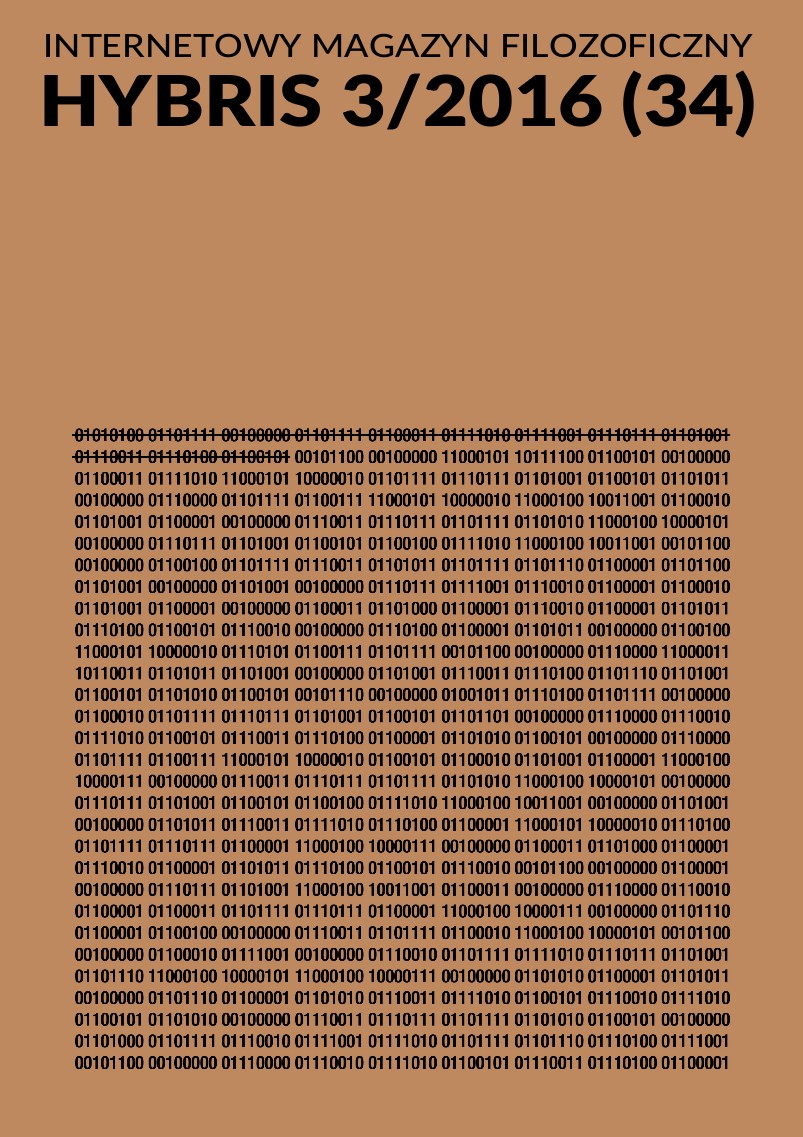Language dynamics in the case of an omniscient in the jain literature of Classical period (5th-10th c. Ce)
DOI:
https://doi.org/10.18778/1689-4286.34.01Keywords:
Jainism, language, sound, matter, mode, living being, mind, epistemology, karmic bondage, omniscienceAbstract
The article “Language Dynamics in the case of an Omniscient” is the study of the idea of an omniscient person on the basis of the classical Jain literature (5th–10th c. CE) in the context of language materiality, human activity and entanglement of a person into karmic bondage.
References
Jain, Br. Hem Chand, Jain Concept of Omniscience, [in:] S. P. Pandey (ed.), Select Papers on Jainism. Study Notes V. 5. 0. 2012, Delhi: International School for Jain Studies, pp. 69-81.
View in Google Scholar
Malvania, Dalsukh, Soni, Jayendra (eds.), 2007, Encyclopedia of Indian Philosophies, vol. 10, Jain Philosophy, part 1, Delhi: Motilal Banarsidass Publ.
View in Google Scholar
Monier-Williams, M., 2005, A Sanskrit-English Dictionary, Delhi: Motilal Banarsidass Publ.
View in Google Scholar
Muni, Nyayavijaya, 1998, Jaina Philosophy and Religion, Delhi: Motilal Banarsidass Publ., Bhogilal Lehar Chand Institute of Indology & Mahattara Sadhvi Shree Mrigavatiji Foundation.
View in Google Scholar
Potter, Karl H., 1991, Presuppositions of India’s Philosophies, Delhi: Motilal Banarsidass Publ.
View in Google Scholar
Singh, Ramjee, 1974, The Jaina Concept of Omniscience, Ahmedabad: L. D. Series 43.
View in Google Scholar
AB = Harṣavardhana Gaṇi: Adhyātma-bindu. Harṣavardhana's Adhyātmabindu: with Autocommentary. 1972, Ahmedabad: L.D. Institute of Indology.
View in Google Scholar
AM = Samantabhadra: Āpta-mīmāṃsā. Gajadharalal Jain (ed.), Āpta-mīmāṃsā Pramāṇa-parīkṣā ca. 1914, Kāśī: Bhāratīya Jaina Siddhāṃta Prakāśinī Saṃsthā.
View in Google Scholar
AS = Akalaṅka Bhaṭṭa: Aṣṭasatī. Cf. AM.
View in Google Scholar
ASā = Vidyānanda: Aṣṭāhasrī. Nāthāraṅgaji Gāṃdhī (ed.), Aṣṭāhasrī. 1915, Bombay: Nirṇaya Sāgara Press.
View in Google Scholar
DS = Nemichandra Siddhanta Chakravarti: Dravya-saṃgraha. S. C. Ghoshal (ed.), Dravya-saṃgraha. 1989, Delhi: Motilal Banarsidass.
View in Google Scholar
DŚ = Jinabhadra Gaṇi: Dhyāna-śataka. S. K. Ramachandra Rao (ed.), Dhyāna-śataka. 2002, Bengalore: Kalpatharu Research Academy.
View in Google Scholar
DT = Siddhasena Divākara: Dvātriṃśikā. Vijayalāvaṇyasūri (ed.), Dvātriṃśaddvātriṃśikā. 1977, Botad.
View in Google Scholar
GS = Nemichandra Siddhanta Chakravarti: Gommaṭa-sāra. The Sacred Books of the Jainas. Gommatasara Jīva-kāṇḍa, vol. 5, tr., com. Rai Bahadur J. L. Jaini. 1927, Lucknow: Pandit Ajit Prasada, The Central Jaina Publishing House Ajitashram.
View in Google Scholar
LTS = Amṛtachandra: Laghu-tattva-sphoṭa. Padmanabh Srivarma Jaini (ed.), Laghu-tattva-sphoṭa. 1978, Ahmedabad: L.D. Institute of Indology.
View in Google Scholar
PAP = Yogīndudeva: Paramâtma-prakāśa. Jagdish Prasad Jain Sadhak (ed.), Paramâtma-prakāśa, tr. Rickhab Dass Jain. 2000, Delhi: Radiant Publishers.
View in Google Scholar
PKM = Prabhācandra: Prameya-kamala-mārtaṇḍa. Mahendrakumar Sastri (ed.), Prameya-kamala-mārtaṇḍa. 1990, Delhi: Sri Garib Dass Oriental Series, Sri Satguru Publications.
View in Google Scholar
PM = Hemachandra: Pramāṇa-mīmāṃsā. S. Mookerjee, N. Tatia (eds.), Pramāṇa-mīmāṃsā. 1970, Varanasi: Tara Publications.
View in Google Scholar
RVār = Akalaṅka Bhaṭṭa: Tattvârtha-sūtra-rāja-vārttika. Mahendrakumar Jain (ed.), Tattvârtha-vārtikam [rāja-vārtikam]. Hindī anuvāda sahita. 1953, Kāśī: Bhāratīya Jñānapītha.
View in Google Scholar
RVār(b) = Akalaṅka Bhaṭṭa: Tattvârtha-sūtra-rāja-vārttika. The Jaina World of Non-Living [Non-living in Tattvārthasūtra]. English Translation with Notes on Chapter Five of Tattvārtha-Rājavārtika od Akalaṅka (Royal-Semi-aphorismic Explanatory of Reals) On Tattvārtha-sūtra (Treatise on Reals) by Ācārya Umāsvāmi, tr. N. L. Jain. 2000, Varanasi, Pradyuman Zaveri, Plano TX., U.S.A.: Pārśwanātha Vidyāpītha.
View in Google Scholar
SAS = Pūjyapāda Devanandin: Sarvârtha-siddhi. Tattvârtha-vṛttiḥ Sarvârtha-siddhiḥ, Pūjyapāda Devanandin. Śrisekhārāma Nemichandra Granthāmālā 128. 1939, Ṣodaśapur: Devajī Sakhārām Diśī & Māṇikacandra-digambara-jaina-parīkṣālaya-mantri.
View in Google Scholar
SJS = Haribhadra-sūri: Sarvajña-siddhi. Śirapura: Śrī Jaina Sāhitya Vardhaka Sabhā.
View in Google Scholar
SSār = Kundakunda: Samaya-sāra. R. B. J. L. Jaini (ed.), The Sacred Books of the Jainas, vol. 8. 1930, Lucknow: Central Jaina Publishing House.
View in Google Scholar
SŚP = Vidyānanda: Satya-śāsana-parīkṣā. Gokulchandra Jain (ed.), Vidyānandi-kṛta-Satyaśāsanaparīkṣā. 1964, Varanasi: Jnanapitha Murtidevi Jain Granthamala Sanskrit Grantha no. 30.
View in Google Scholar
SV = Akalaṅka Bhaṭṭa: Siddhi-viniścaya. Mahendrakumār Jain (ed.), Siddhi-viniścaya of Akalaṅka edited with the commentary Siddhi-viniścaya-ṭīkā of Anantavīrya, 2 vols. 1959, Vārāṇasī: Bhāratīya Jñānapīṭha Prakāśana.
View in Google Scholar
ŚVār = Vidyānanda, Tattvârtha-sūtra-śloka-vārttika. Jayendra Soni (ed.), Aspects of Jaina Philosophy. Lectures Delivered Under the Auspices of Annual Lecture Series 1994-95 at the Department of Jainology, University of Madras. 1996, Madras: Research Foundation for Jainology.
View in Google Scholar
TS = Umāsvâmi/Umāsvāti: Tattvârtha-sūtra. Sh. C. Jain (ed.), Jainism, Key to Reality, tr., Sh. C. Jain. 2011, Jambudweep, Hastinapur: Digamar Jain Trilok Shodh Sansthan.
View in Google Scholar
TSBh = Tattvârtha-sūtra-bhāṣya. Ohira Suzuko (ed.), A Study of Tattvārthasūtra with Bhāṣya. 1982, Ahmedabad: L. D. Institute of Indology.
View in Google Scholar
ViP = Viyāhapannatti. J. Deleu (ed.), Viyāhapannatti (Bhagavaī). The Fifth Anga of the Jaina Canon. Introduction, Critical Analysis, Commentary & Indexes. 1970, Brugge (België): “De Tempel”, Tempelhof 37.
View in Google Scholar
Downloads
Published
How to Cite
Issue
Section
License

This work is licensed under a Creative Commons Attribution-NonCommercial-NoDerivatives 4.0 International License.






